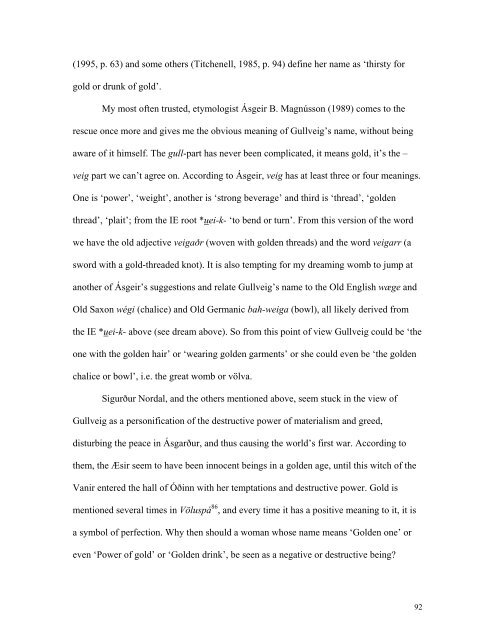You also want an ePaper? Increase the reach of your titles
YUMPU automatically turns print PDFs into web optimized ePapers that Google loves.
(1995, p. 63) <strong>and</strong> some others (Titchenell, 1985, p. 94) define her name as ‘thirsty for<br />
gold or drunk <strong>of</strong> gold’.<br />
My most <strong>of</strong>ten trusted, etymologist Ásgeir B. Magnússon (1989) comes to the<br />
rescue once more <strong>and</strong> gives me the obvious meaning <strong>of</strong> Gullveig’s name, without being<br />
aware <strong>of</strong> it himself. <strong>The</strong> gull-part has never been complicated, it means gold, it’s the –<br />
veig part we can’t agree on. According to Ásgeir, veig has at least three or four meanings.<br />
One is ‘power’, ‘weight’, another is ‘strong beverage’ <strong>and</strong> third is ‘thread’, ‘golden<br />
thread’, ‘plait’; from the IE root *uei-k- ‘to bend or turn’. From this version <strong>of</strong> the word<br />
we have the old adjective veigaðr (woven with golden threads) <strong>and</strong> the word veigarr (a<br />
sword with a gold-threaded knot). It is also tempting for my dreaming womb to jump at<br />
another <strong>of</strong> Ásgeir’s suggestions <strong>and</strong> relate Gullveig’s name to the Old English wæge <strong>and</strong><br />
Old Saxon wégi (chalice) <strong>and</strong> Old Germanic bah-weiga (bowl), all likely derived from<br />
the IE *uei-k- above (see dream above). So from this point <strong>of</strong> view Gullveig could be ‘the<br />
one with the golden hair’ or ‘wearing golden garments’ or she could even be ‘the golden<br />
chalice or bowl’, i.e. the great womb or völva.<br />
Sigurður Nordal, <strong>and</strong> the others mentioned above, seem stuck in the view <strong>of</strong><br />
Gullveig as a personification <strong>of</strong> the destructive power <strong>of</strong> materialism <strong>and</strong> greed,<br />
disturbing the peace in Ásgarður, <strong>and</strong> thus causing the world’s first war. According to<br />
them, the Æsir seem to have been innocent beings in a golden age, until this witch <strong>of</strong> the<br />
Vanir entered the hall <strong>of</strong> Óðinn with her temptations <strong>and</strong> destructive power. Gold is<br />
mentioned several times in Völuspá 86 , <strong>and</strong> every time it has a positive meaning to it, it is<br />
a symbol <strong>of</strong> perfection. Why then should a woman whose name means ‘Golden one’ or<br />
even ‘Power <strong>of</strong> gold’ or ‘Golden drink’, be seen as a negative or destructive being?<br />
92


